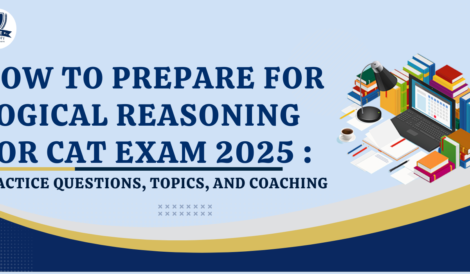Table of Contents
The Common Admission Test (CAT) is one of the most prestigious and challenging entrance exams for aspiring MBA students in India. Conducted by the Indian Institutes of Management (IIMs), CAT serves as a gateway to not only the IIMs but also to many other top business schools in the country. Given its reputation, many students wonder about the difficulty level of the CAT exam. This blog aims to provide a detailed analysis of the CAT exam, its difficulty level, factors contributing to its complexity, and strategies to overcome these challenges.
How Hard is the CAT Exam? A Comprehensive Guide
Candidates looking to enhance their preparation for the CAT 2024 exam can join a CAT Coaching Classroom Programme. This Programme provides study notes and a comprehensive guide, ensuring a structured and effective study plan.
Understanding the CAT Exam
Before diving into the difficulty level, it’s essential to understand the structure of the CAT exam. The CAT exam is divided into three main sections
- Quantitative Aptitude (QA)
- Verbal Ability and Reading Comprehension (VARC)
- Data Interpretation and Logical Reasoning (DILR)
Each section is timed, and candidates need to manage their time efficiently to perform well in all sections. The total duration of the exam is 180 minutes, with 60 minutes allocated to each section. Here’s a brief overview of each section
Quantitative Aptitude (QA):
- Focuses on mathematical concepts.
- Topics include Arithmetic, Algebra, Geometry, Number System, and Modern Math.
Verbal Ability and Reading Comprehension (VARC):
- Tests English language skills and comprehension.
- Includes reading comprehension passages, grammar, vocabulary, sentence correction, and para jumbles.
Data Interpretation and Logical Reasoning (DILR):
- Evaluates analytical and logical reasoning abilities.
- Involves interpreting data from tables, graphs, charts, and solving logical puzzles and sequences.
Factors Contributing to the Difficulty of CAT
- Diverse Syllabus:
- The CAT exam covers a wide range of topics, especially in the Quantitative Aptitude and VARC sections. Mastering these diverse subjects requires a comprehensive understanding and consistent practice.
- Time Management:
- Each section is timed, and candidates need to answer questions within the allocated 60 minutes. Managing time effectively is crucial to attempt all questions accurately.
- Negative Marking:
- The CAT exam follows a negative marking scheme, where incorrect answers result in a deduction of marks. This adds to the pressure, as candidates must balance accuracy with speed.
- High Competition:
- With lakhs of candidates appearing for the exam each year, the competition is fierce. Achieving a high percentile is essential for securing admission to top B-schools.
- Unpredictable Question Patterns:
- The pattern and difficulty level of questions can vary each year, making it challenging to predict and prepare for specific types of questions.
Wise Difficulty Analysis
Quantitative Aptitude (QA):
The Quantitative Aptitude section is often considered challenging due to the following reasons:
- Complexity of Problems: The questions are designed to test a deep understanding of mathematical concepts and their applications. Some problems require advanced problem-solving skills and quick calculations.
- Wide Range of Topics: The syllabus includes various topics such as Arithmetic, Algebra, Geometry, Number System, and Modern Math. Excelling in this section requires a strong grasp of all these topics.
- Time Constraints: With limited time to solve each question, speed and accuracy are crucial. Many candidates struggle to complete this section within the allotted time.
Verbal Ability and Reading Comprehension (VARC):
The VARC section tests candidates’ English language proficiency and reading skills. The difficulty level can be attributed to:
- Reading Comprehension Passages: The passages can be lengthy and complex, requiring a thorough understanding to answer questions accurately. Managing time while reading and comprehending these passages is a significant challenge.
- Grammar and Vocabulary: The section includes questions on grammar, vocabulary, and sentence correction. Candidates need a strong command of the English language to perform well.
- Variety of Question Types: The section includes multiple types of questions, such as para jumbles, summary writing, and critical reasoning. Preparing for this variety adds to the difficulty.
Data Interpretation and Logical Reasoning (DILR):
The DILR section is considered one of the most challenging due to:
- Data Interpretation Sets: Candidates need to interpret data from tables, graphs, and charts. These sets can be complex and require quick analysis and calculations.
- Logical Puzzles: The logical reasoning part includes puzzles and sequences that test analytical and logical thinking. These puzzles can be tricky and time-consuming.
- Accuracy and Speed: Balancing accuracy with speed is crucial, as incorrect answers lead to negative marking. Many candidates find it difficult to solve these problems accurately within the time limit.
Strategies to Overcome CAT Exam Challenges
While the CAT exam is undoubtedly challenging, the right strategies and preparation can help candidates overcome these difficulties. Here are some effective strategies:
- Understand the Syllabus and Exam Pattern:
- Familiarize yourself with the syllabus and exam pattern. Knowing what to expect helps in planning your preparation effectively.
- Create a Study Plan:
- Develop a structured study plan that covers all topics systematically. Allocate time for each section and ensure regular practice and revision.
- Focus on Fundamentals:
- Strengthen your basics in Quantitative Aptitude, VARC, and DILR. A strong foundation is crucial for solving complex problems.
- Regular Practice:
- Practice is key to success in the CAT exam. Solve a variety of problems from each section regularly to improve speed and accuracy.
- Take Mock Tests:
- Mock tests simulate the actual exam environment and help in time management. Analyze your performance in mock tests to identify strengths and weaknesses.
- Work on Weak Areas:
- Identify your weak areas and focus on improving them. Regular practice and revision can help in overcoming these weaknesses.
- Develop Time Management Skills:
- Time management is crucial in the CAT exam. Practice solving questions within a time limit to improve speed and efficiency.
- Stay Updated with Current Affairs:
- While current affairs are not directly tested, staying updated helps in reading comprehension and essay writing in the selection process.
- Join Study Groups or Coaching:
- Join study groups or coaching classes for guidance and support. Interacting with peers and mentors can provide valuable insights and tips.
- Stay Positive and Motivated:
- Maintaining a positive attitude and staying motivated throughout your preparation is essential. Set realistic goals and reward yourself for achieving them.
Common Myths About the CAT Exam
There are several myths surrounding the CAT exam that can add to the perceived difficulty. Here are some common myths and the reality behind them:
- Myth: Only Engineers Can Crack CAT:
- Reality: While a significant number of CAT toppers are engineers, candidates from all backgrounds can excel in the exam with the right preparation and strategy.
- Myth: High IQ is Necessary:
- Reality: The CAT exam tests aptitude and preparation, not innate intelligence. Consistent practice and a strong understanding of concepts are key to success.
- Myth: Coaching is Mandatory:
- Reality: Coaching can be helpful but is not mandatory. Many candidates crack CAT through self-study and disciplined preparation.
- Myth: CAT is Only for Fresh Graduates:
- Reality: Candidates with work experience can also perform well in CAT. In fact, work experience can be an advantage during the selection process.
- Myth: More Study Hours Guarantee Success:
- Reality: Quality of study is more important than quantity. Effective preparation involves understanding concepts, regular practice, and analyzing performance.
- How important is it to join a coaching institute for CAT preparation?
- While coaching institutes provide structured guidance and resources, they are not mandatory. Many candidates successfully clear CAT through self-study with the right materials and disciplined preparation.
- How important is it to join a coaching institute for CAT preparation?
Quantitative Aptitude (QA):
- Understand Basic Concepts:
- Start with the basics and ensure a strong understanding of fundamental concepts in arithmetic, algebra, geometry, and number systems.
- Practice Regularly:
- Solve a variety of problems from different topics. Regular practice helps in improving speed and accuracy.
- Use Shortcuts and Tricks:
- Learn shortcuts and tricks for quick calculations. This can save valuable time during the exam.
- Focus on Weak Areas:
- Identify and work on weak areas. Regular revision and practice can help in overcoming these weaknesses.
Verbal Ability and Reading Comprehension (VARC):
- Read Widely:
- Develop a habit of reading newspapers, magazines, and books. This helps in improving reading speed and comprehension skills.
- Practice Comprehension Passages:
- Regularly practice comprehension passages. Focus on understanding the main idea, tone, and inference-based questions.
- Improve Vocabulary:
- Work on building a strong vocabulary. Use flashcards and word lists to learn new words and their usage.
- Grammar and Sentence Correction:
- Practice grammar and sentence correction questions. Understanding basic grammar rules is essential for this section
Data Interpretation and Logical Reasoning (DILR)
- Interpret Data Efficiently:
- Practice interpreting data from various sources like tables, graphs, and charts. Focus on quick and accurate calculations.
- Solve Logical Puzzles:
- Regularly solve logical puzzles and reasoning questions. This helps in developing analytical thinking and problem-solving skills.
- Focus on Accuracy:
- While speed is important, accuracy is crucial in DILR. Avoid guesswork and focus on solving problems correctly.
- Take Sectional Tests:
- Take sectional tests to improve time management and get a feel of the actual exam environment.
Psychological Preparation
Apart from academic preparation, psychological readiness is crucial for success in CAT. Here are some tips to stay mentally prepared:
- Stay Positive:
- Maintain a positive attitude and believe in your abilities. Confidence is key to performing well under pressure.
- Manage Stress:
- Practice relaxation techniques like meditation and deep breathing to manage stress and stay calm.
- Set Realistic Goals:
- Set achievable goals and work towards them consistently. Celebrate small milestones to stay motivated.
- Avoid Burnout:
- Take regular breaks and ensure adequate rest. Avoid overloading yourself with too much study material.
- Seek Support:
- Join study groups or seek support from friends and family. Discussing problems and sharing knowledge can be beneficial.
Importance of Mock Tests and Previous Years’ Papers
Mock tests and previous years’ papers play a significant role in CAT preparation. Here’s why they are important:
- Simulate Exam Conditions:
- Mock tests simulate the actual exam environment, helping candidates get accustomed to the pressure and time constraints.
- Identify Weaknesses:
- Analyzing mock test results helps in identifying weak areas. Candidates can then focus on improving these areas.
- Improve Time Management:
- Regular mock tests help in developing time management skills. Candidates learn to allocate time efficiently to each section.
- Understand Question Patterns:
- Solving previous years’ papers gives an insight into the type of questions asked in the exam. This helps in better preparation and anticipation.
- Build Confidence:
- Consistent performance in mock tests builds confidence and reduces exam-day anxiety.
Role of Coaching Institutes
While coaching institutes are not mandatory, they can provide structured guidance and resources. Here’s how coaching can be beneficial:
- Structured Curriculum:
- Coaching institutes follow a structured curriculum that covers the entire syllabus systematically.
- Experienced Faculty:
- Experienced faculty members provide insights and tips that can be valuable for preparation.
- Peer Learning:
- Interacting with peers in coaching classes provides an opportunity for collaborative learning and knowledge sharing.
- Regular Assessments:
- Coaching institutes conduct regular assessments and mock tests, helping candidates track their progress.
- Doubt Clearing Sessions:
- Dedicated doubt clearing sessions help in resolving queries and understanding difficult concepts better.
However, self-study can also be equally effective with the right resources and discipline. Candidates need to choose a preparation method that suits their learning style and schedule.
Tips for Working Professionals
For working professionals preparing for CAT, managing time effectively is crucial. Here are some tips:
- Create a Study Schedule:
- Develop a study schedule that balances work and preparation. Allocate specific hours for study each day.
- Utilize Weekends:
- Use weekends for intensive study sessions and mock tests. This helps in covering more syllabus and practicing regularly.
- Make Use of Commute Time:
- Utilize commute time to read newspapers, solve puzzles, or revise notes. Every minute counts in preparation.
- Stay Disciplined:
- Maintain a disciplined approach towards study. Consistency is key to managing work and preparation effectively.
- Seek Support from Employer:
- If possible, seek support from your employer for flexible working hours or study leave closer to the exam.
Maintaining a Healthy Lifestyle
A healthy lifestyle is crucial for effective preparation. Here are some tips:
- Balanced Diet:
- Maintain a balanced diet to ensure physical and mental well-being. Avoid junk food and stay hydrated.
- Regular Exercise:
- Regular exercise helps in reducing stress and maintaining energy levels. Simple activities like walking or yoga can be beneficial.
- Adequate Sleep:
- Ensure adequate sleep to keep the mind fresh and alert. Avoid late-night study sessions that can disrupt sleep patterns.
- Stay Hydrated:
- Drinking enough water is essential for maintaining concentration and overall health.
- Take Breaks:
- Taking short breaks during study sessions helps in avoiding burnout and maintaining productivity.
Crash Course: Enroll in a Crash Course 3 Months Before the CAT Exam
For those aiming to gain rigorous practice and learn tricks and shortcuts, enrolling in a crash course three months before the CAT exam is highly beneficial. GICE ACADEMY offers a Crash Course specifically designed to boost your concepts and speed, providing an intensive preparation experience to help you excel in the exam.
How difficult is the CAT exam compared to other entrance exams?
The CAT exam is considered one of the most challenging management entrance exams due to its diverse syllabus, high competition, and time management requirements.
Can an average student crack the CAT exam?
Yes, with dedicated preparation, regular practice, and the right strategies, an average student can crack the CAT exam.
What is the ideal time to start preparing for the CAT exam?
Ideally, candidates should start preparing at least 6-9 months before the exam. However, with focused and disciplined study, a shorter preparation time can also be effective.
What are some common mistakes to avoid during CAT preparation?
Common mistakes include neglecting weak areas, not taking mock tests seriously, and focusing more on quantity rather than quality of study.








